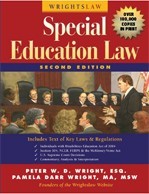Background
Shannon
Carter has dyslexia and ADHD. When she entered high school, she was
functionally illiterate. Her reading skills were at the 5th grade
level. She was depressed and felt hopeless.
After finding Shannon eligible for special education, the school district
offered an IEP. According to this IEP, Shannon would progress from
the 5.4 to the 5.8 grade level in reading and from the 6.4 to 6.8
grade level in Math - she would make four months of progress after
a year of special education.
This IEP guaranteed that Shannon would fall even further behind her
peer group.
Shannon's parents advised the school that this IEP was inadequate
to meet Shannon's needs. Mr. and Mrs. Carter asked Florence County
to provide a more intensive program so Shannon would learn to read
and be reading on a high school level when she graduated from high
school.
Florence County refused so Shannon's parents placed her in Trident
Academy, a private school that specializes in educating children with
language learning disabilities like dyslexia. The parents requested
a special education due process. They lost. They requested a review
- and lost again. When Shannon's case went to federal court, the tide
turned. Eventually, Shannon's case was heard by the U. S. Supreme
Court who ruled 9-0 in her favor.
On this page, you will find links to the decisions in Shannon Carter's
case, the "Untold Story of Carter," articles about Shannon's
case, and resources about the U. S. Supreme Court.
Carter
Decisions
U.
S. District Court
After
Shannon's parents lost at Due Process and Review, they placed Shannon
into Trident Academy and sued for tuition in Federal Court. Judge
Houck appointed his own expert, charted out Shannon's educational
test data.
Judge
Houck concluded that Florence County's IEP that would have Shannon
progress from the 4.4 reading grade level to the 4.8 grade level (after
one year of special education) was wholly inadequate. U.
S. District Court Decision, Shannon Carter v. Florence County
Florence
County Appeals to U. S. Court of Appeals for the Fourth Circuit
When
Florence County School District IV appealed to the Fourth Circuit,
they argued that four months of progress in reading was appropriate.
They also argued that because Trident Academy was not on the state's
non-existent "approved" list of schools, Shannon's parents could not
be reimbursed for her tuition at the private school. In a unanimous
decision for Shannon, the Fourth Circuit discussed "least restrictive
environment" issues, and a contrary Second Circuit case. This ruling
in Shannon's favor created a "split" among circuits that opened the
door to a further appeal. U.
S. Court of Appeals for the Fourth Circuit Court, Decision, Florence
County v. Shannon Carter.
Oral
Argument Before the U. S. Supreme Court
On October
6, 1993, the U. S. Supreme Court heard Oral
Arguments in the Carter case. The transcript is available
in three formats.
Transcript
of Oral Argument before the U. S. Supreme Court.
In
pdf: https://www.wrightslaw.com/law/caselaw/Carter_Oral_Argument.pdf
In
HTML
In MP3 Audio
Listen to the Oral Argument (MP3 download)
U.
S. Supreme Court Issues Unanimous Decision
On November
9, 34 days after oral argument, the Supreme Court issued a unanimous
9-0 decision for Shannon.
The justices
held that if public school defaults and the child receives an appropriate
education in a private placement, the parents are entitled to be reimbursed
for the education that should have been provided by the School District.
The case is "styled" Florence
County School District Four v. Shannon Carter, 510 U.S. 7, (1993).
More
Information about Shannon Carter's case & the U. S. Supreme Court
How
Shannon Carter Changed Special Education. Article by Brent Staples
of The New York Times with links to decisions in Shannon's landmark
case, articles, reading research, and more.
Three
Generations at the Supreme Court. On October 6, 1993, Shannon
Carter and Roger Saunders traveled to Washington, DC to hear Pete's
oral argument before the U. S. Supreme Court. This article discusses
the impact of the Orton Dyslexia Society members (now International
Dyslexia Association) Helene Dubrow, Diana Hanbury King, Roger Saunders,
and Linda Summer.
Florence
County School District IV v. Shannon Carter: The Untold Story.
The story behind the story and Pete's involvement in the case and
preparation for argument before the Fourth Circuit and U.S. Supreme
Court is in our "Advocacy Library" and known as "The Untold Story."
The
U. S. Supreme Court
Here
are some links about the U. S. Supreme Court.
Legal
Information Institute from Cornell University: Supreme Court Collection
U.
S. Supreme Court Newsletter
Subscribers receive an e-mail bulletin containing summary and analysis
of important patent appeals decisions of the U.S. Court of Appeals
for the Federal Circuit within days after they have been handed down
and placed on the Internet, along with instructions on how to access
those decisions in full text.
For subscription
instructions, go to
http://www.law.cornell.edu/focus/bulletins.html
FED
WORLD
Search
and view full text of U. S. Supreme Court Decisions from 1937 and
1975.
LINK:
http://www.fedworld.gov/supcourt/index.htm
THE
OYEZ PROJECT
The
U. S. Supreme Court Multimedia Database From Northwestern University
Take a "Virtual Tour"
of the Supreme Court.
Legal
Resources From Wrightslaw 
Wrightslaw
Law Library. Includes cases, pleadings, special education
statute and regulations, articles about tactics and strategy.
The
Special Ed Advocate Newsletter
Free newsletter about legal and advocacy issues from Wrightslaw.
Wrightslaw:
Special Education Law
Includes the full text of the Individuals with Disabilities Act, Section
504 of the Rehabilitation Act, Family Educational Rights and Privacy
Act, and implementing regulations; decisions in landmark special education
cases by the U. S. Supreme Court.
To Top
To
Special Ed Advocacy Library
To
Law Library
Return
to Home Page

